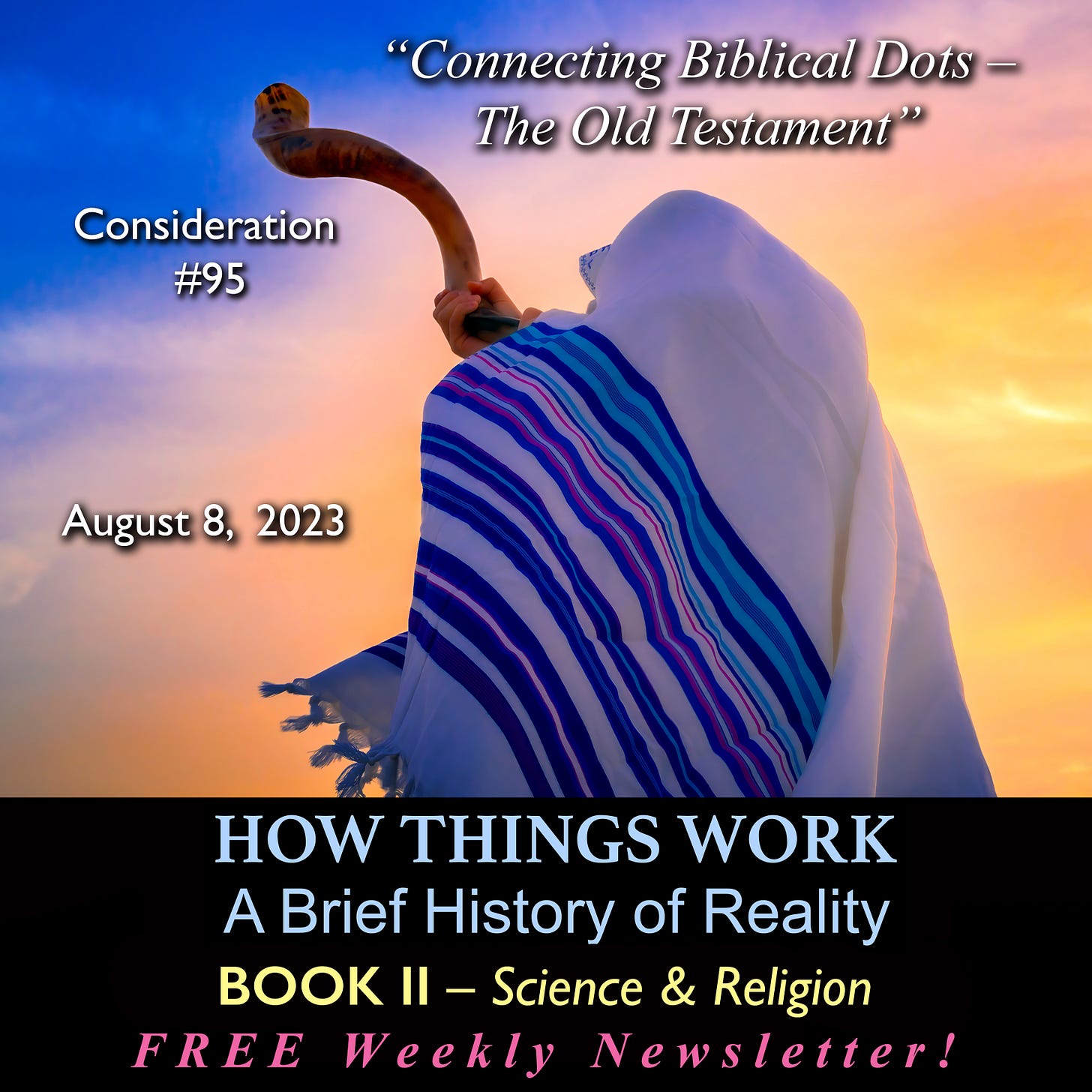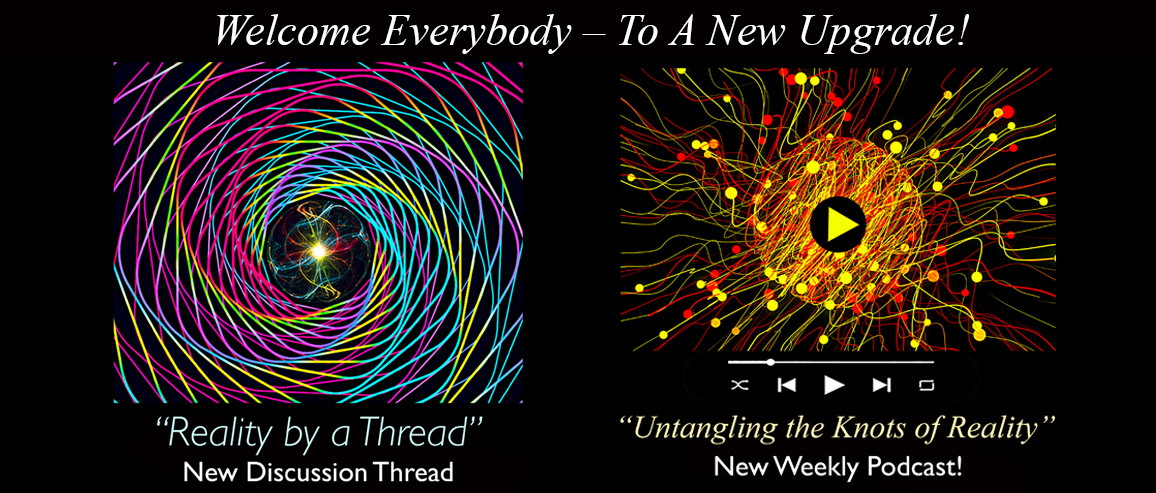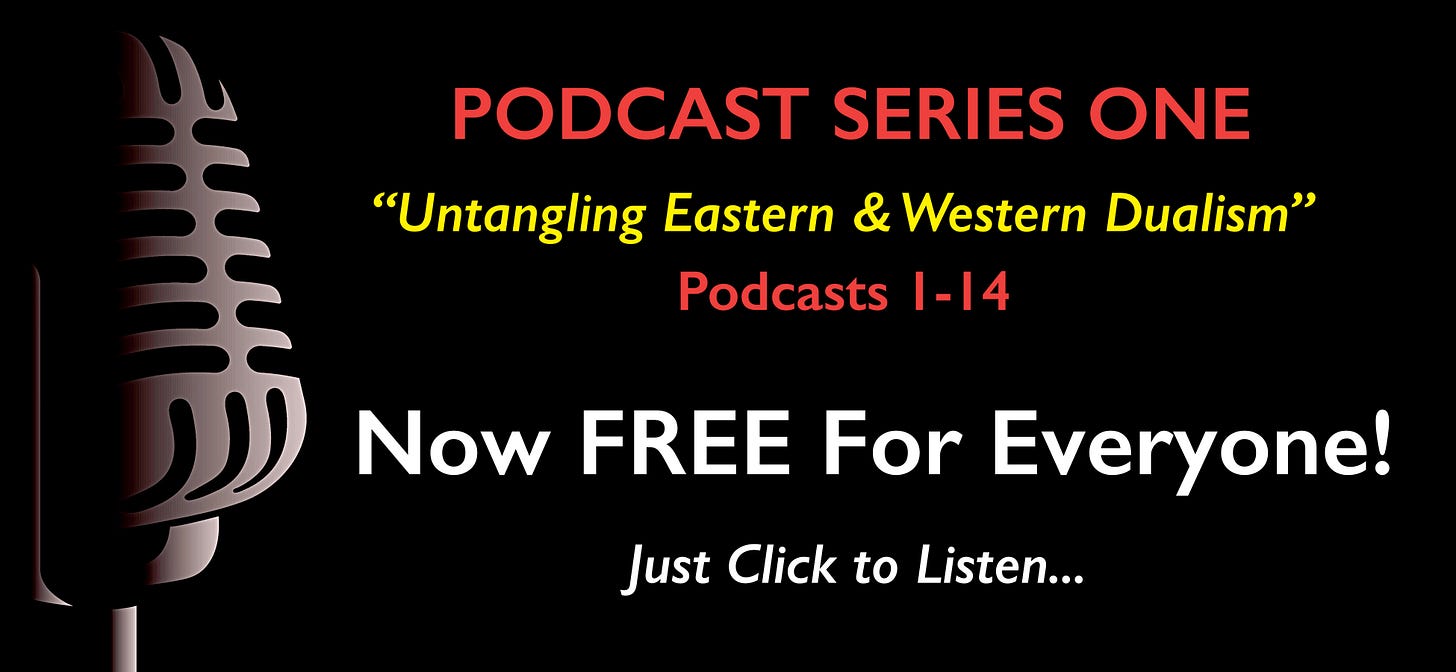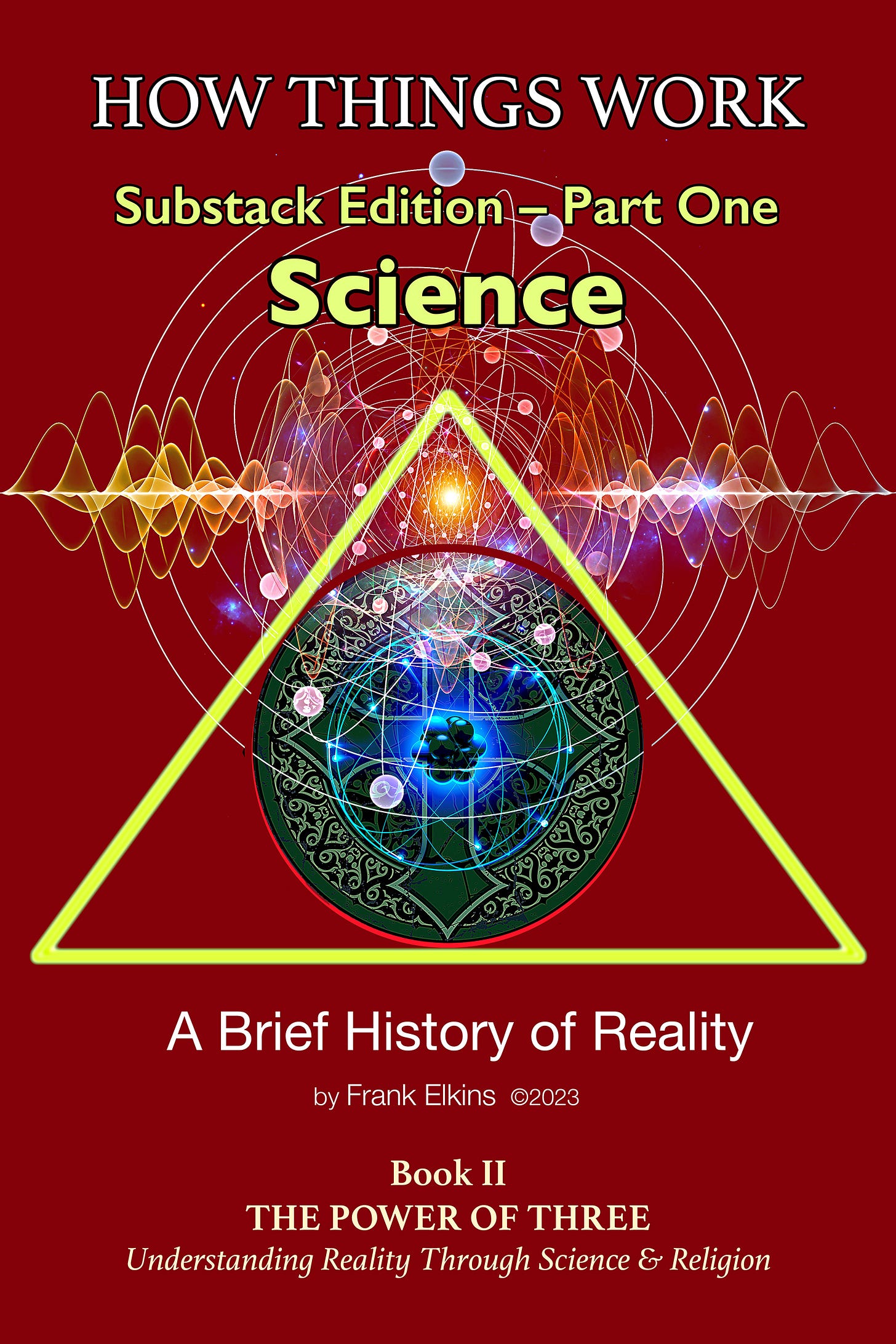How Things Work: A Brief History of Reality
BOOK II: The Power of Three (Science & Religion) – Consideration #95. "Connecting Biblical Dots – The Old Testament"
Be a part of the Conversation!
Tuesday August 8, 2023
“We account the Scriptures of God to be the most sublime philosophy. I find more sure marks of authenticity in the Bible than in any profane history whatever.”
- Isaac Newton
PREFACE
I regard Abraham as my ancestor. Some of the greatest inspiration I have got has come from what we call the Old Testament prophets and what Jews would say "our prophets."
– Desmond Tutu
Welcome Everybody!
It is interesting to note that within the first three chapters of Genesis the seeds of consideration related to the Age of Reason and Enlightenment philosophy have already been sown. John Locke’s concept of “Natural Rights” and Thomas Hobbes’ concept of an all-powerful “Leviathan,” become manifested through an omnipotent, omniscient, and omnipresent Being, or “Authority,” called God.
For Locke, it represents the authority responsible for endowing human beings with their natural “inalienable” rights as established in the Declaration of Independence. The Bible is the essential source for understanding what Locke calls “first principles.”
“The Bible is one of the greatest blessings bestowed by God on the children of men. It has God for its author; salvation for its end, and truth without any mixture for its matter. It is all pure…”
“The works of nature and the works of revelation display religion to mankind in characters so large and visible that those who are not quite blind may in them see and read the first principles and most necessary parts of it and from thence penet [penetrate] into those infinite depths filled with the treasures of wisdom and knowledge...”
– John Locke
For Hobbes, it represents the divine proof of the necessity for an unlimited source of Power and Authority as a means for maintaining order and stability through unquestionable sovereignty.
“But where God himselfe, by supernaturall Revelation, planted Religion; there he also made to himself a peculiar Kingdome; and gave Lawes, not only of behavior towards himself; but also towards one another; and thereby in the Kingdome of God, the Policy, and lawes Civill, are a part of Religion; and therefore the distinction of Temporall, and Spiritual Domination, hath there no place….”
“I find the Kingdome of God, to signifie in most places of Scripture, a Kingdome properly so named, constituted by the Votes of the People of Israel in peculiar manner; wherein they chose God for their King by Covenant made with him, upon Gods promising them the possession of the land of Canaan…”
– Thomas Hobbes
CONSIDERATION #95 – Connecting Biblical Dots: The Old Testament
Hobbes recognizes God as the model for the ultimate Leviathan, who enters a contract, or covenant, with “His people” in which “He” provides land, law, and security and “they” accept “Him” as their sole authority and Sovereign. Earthly leviathans, such as monarchs, reflect this “divine” concept of “sovereignty.”
However, Locke’s interpretation of the Bible leads him to a concept of “Natural Rights” that becomes the cornerstone for the Declaration of Independence:
“We hold these truths to be self-evident, that all men are created equal, that they are endowed by their Creator with certain unalienable Rights, that among these are Life, Liberty and the pursuit of Happiness. That to secure these rights, Governments are instituted among Men, deriving their just powers from the consent of the governed…”
– Declaration of Independence
Hobbes’ interpretation of the Bible leads him to the concept of a “political leviathan” who acts as a “mortal god” interpreting the divine will of the “immortal God” as the political model best suited to establishing and maintaining peace, order, and defense.
“The multitude so united in one person is called a COMMONWEALTH; in Latin, CIVITAS. This is the generation of that great LEVIATHAN, or rather, to speak more reverently, of that mortal god to which we owe, under the immortal God, our peace and defence.”
― Thomas Hobbes, Leviathan
Ironically, Locke’s understanding of the same Bible leads him to a different conclusion. Locke recognizes an “all powerful” Authority who bestows upon all humanity “equality” under the “Natural Laws” of God. Therefore, “all men” are equal under “The Law.” However, The Law is not designed to restrict individual freedom, it is designed to expand individual freedom. For Locke, the individual is not limited by the enforcement of Natural Law but liberated by it.
“The end [purpose] of law is not to abolish or restrain, but to preserve and enlarge freedom. For in all the states of created beings capable of law, where there is no law, there is no freedom.”
– John Locke
Essentially, the “power” to “govern ourselves” through our own “reason” based on our own self-evident “human rights” is given to us by “The Creator,” or God. It is the foundation for the Declaration of Independence, the United States Constitution, and the Bill of Rights.
The state of nature has a law of nature to govern it, which… teaches all mankind, who will but consult it, that being all equal and independent, no one ought to harm another in his life, health, liberty, or possessions.
– John Locke
POSTSCRIPT
A foundational aspect of Biblical narrative is that there is order, and a level of hierarchy, in the empirical world. It is a “rational” world functioning under “rational” laws. In Western terms, God and the rational world are above the empirical physical world. Within the empirical world, human beings represent the highest level of life and intelligence. Empirical rulers, what Hobbes calls Leviathans, oversee the general population, making societies possible. However, and most importantly, everything, and everyone, in empirical reality, despite their position in the empirical hierarchy, are equally bound by the same “laws” of God, or Nature.
In terms of empirical hierarchy, we see a similar structure outlined in Taoism:
Therefore, "Tao is great;
Heaven is great;
Earth is great;
The king is also great."
These are the four great powers of the universe,
And the king is one of them.Man follows Earth.
Earth follows heaven.
Heaven follows the Tao.
Tao follows what is natural.– Tao Te Ching #25
What is ironic, is that the “God” depicted in the beginning of Genesis is really not that much of an “authoritarian” God at all. Essentially, “He” tells Adam and Eve they can do whatever they want to do with only “one” exception. Just one. And that is only because it would ultimately hurt them.
“You are free to eat from any tree in the garden; but you must not eat from the tree of the knowledge of good and evil, for when you eat from it you will certainly die.”
Genesis 2:16-17
However, breaking this one exception violates the “Law” of God, which inherently results in “empirical” consequences. If we consider this “law” of God to be instead a “law of nature,” such as gravity, it could be understood more as a “divine caution” as opposed to an “authoritarian threat.” We do not think of someone as authoritarian because they warn a suicide “jumper” that if they jump the law of gravity will manifest consequences. You do not splat when you hit the ground because God is angry with you; you splat because you broke the “law” of gravity. One of God’s “Natural” Laws.
In this sense, breaking God’s commandment, or “law,” regarding the Tree of the Knowledge of Good and Evil, may not have resulted in the “fall of Mankind” because of God’s “retribution,” but as a “natural” consequence inevitably resulting from taking such an action. Despite the many possible theological interpretations that could be generated from this story, the empirical result of the narrative is that human beings lose their “natural” connection, or unity, with “God” and begin to experience a divided world of “dualism” as reflected in their “new understanding” of Good and Evil.
Unfortunately, as the narrative continues, human beings demonstrate a proclivity for choosing evil.
Next Week a Special Edition Preview of Book V: “Quantum Consciousness: The Arch of Conscious Awareness…”
This Week on “The Thread”…
Expand the Conversation by Upgrading to “Reality by a Thread!”
•Untangling the Knots of Reality: Podcast #55 “Digital Dualism” (“The essence of digital technology is dualism. Anything related to your computer is a result of dualism. This dualism consists of two choices: “0” or “1” often referred to as “On” and “Off.” However, it is essentially no different than “Good” and “Evil” or “Yin” and “Yang.” All of these are examples of dualism. Dualism always represents a choice between only two possibilities. However, this apparent simplicity, of having only two choices, actually represents the possibility of essentially unlimited choices once generated into reality…”)
• “Reality by a Thread” Discussion Thread: BOOK VI PREVIEW (The Rational Being) – “Algorithms” (“An algorithm is basically a set of instructions explaining how to complete a specific task. Algorithms limit “how” the computer thinks and can therefore be considered the “negative” factor in the Artificial Intelligence paradigm. An algorithm is a “set of instructions” telling the computer “What to think about,” and “how to think it.” It essentially determines and establishes the computer’s “point of view” regarding a particular task or request. For Artificial Intelligence it answers the questions “What am ‘I’ supposed to do and how am ‘I’ supposed to do it...”)
•FREE PDF Download of Book IV: “The Cosmic Symphony – Overtones of String Theory” plus other Free Books, Discounts and Benefits. Also Gain Complete Access to all Previous Podcasts and Threads!
UPGRADE NOW!
Available Now!
Excerpt from PODCAST #9: "Untangling The Noble Eightfold Path"
If you find yourself growing tired of the same old meaningless fluff, this may be the Podcast you’ve been looking for!
Podcast #1 – A Lot of Explaining
Podcast #2 – Untangling Mathematics & Metaphors
Podcast #3 – Untangling the Garden of Eden
Podcast #4 – Untangling The Physical World
Podcast #5 – Untangling the Rational Mind
Podcast #6 – Untangling Eastern & Western Dualism
Podcast #7 – Untangling Zen & the Shaolin Temple
Podcast #8 – Untangling the Mystery of Taoism
Podcast #9 – Untangling The Noble Eightfold Path
Podcast #10 – Untangling Plato's Realm of Forms
Podcast #11 – Untangling Aristotle's Metaphysics
Podcast #12 – Untangling Happiness & Virtues
Podcast #13 – Untangling Self-Evident Truths
Podcast #14 – Untangling The Cosmic Symphony
“Untangling the Knots of Reality – Be A Part of the Conversation!”
Coming This September! The Second “Substack Edition” in the How Things Work Series…
“Reality is built on Abstraction…”
Book II The Power of Three – Substack Edition (Part One) SCIENCE







